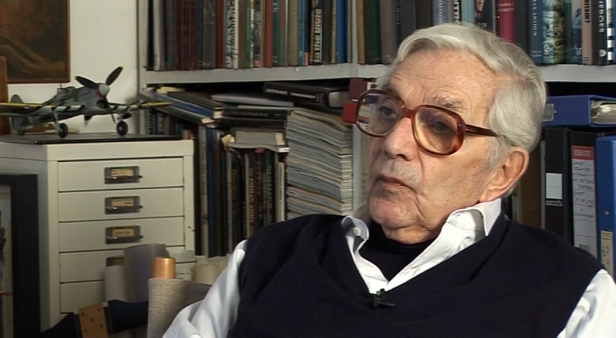NEXT STORY

'We used to miss a lot of targets'
RELATED STORIES

NEXT STORY

'We used to miss a lot of targets'
RELATED STORIES


|
Views | Duration | |
|---|---|---|---|
| 21. Pre-flight superstitions | 172 | 01:11 | |
| 22. The Falaise Gap: the smell of death | 276 | 03:40 | |
| 23. 'We used to miss a lot of targets' | 155 | 01:01 | |
| 24. Reunion at Duxford | 160 | 02:15 | |
| 25. Belsen concentration camp | 236 | 02:36 | |
| 26. Distractions from the heavy impact of the war | 149 | 01:05 | |
| 27. Everlasting bonds with fellow pilots | 186 | 02:55 | |
| 28. Bailing out: 'We didn't have ejector seats in those days' | 161 | 03:26 | |
| 29. Spending another year in Germany after the war | 256 | 01:01 | |
| 30. Riverside Studios: how I got started in film | 186 | 02:11 |


You know, a lot of Germans are asking me, well, how did it feel like, killing Germans, you know? And I said, well, I didn't have any sentimentality on that level, because I lost a lot of my family in concentration camps, and so on, so that... did not affect me. And the other thing, of course, is that you really are not in contact with the individual, like an infantry or commando would be. So... when we flew over the Falaise Gap and... where the Germans were, they couldn't get out... and... we caused an enormous amount of havoc there. And the next day my squadron commander, who actually was Scotty, said, 'Why don't you take a 15 hundredweight with your flight down to Falaise, and you'll see for the first time the damage that you did with your flight', and so on. And it was a terrible trip because the tank battalions were all trying to move forward, and it was like a traffic jam on the M25 or something. It wouldn't move. And the smell was terrible, you know, because there were dead animals, and so on. So we all put handkerchiefs in front… because you couldn't get back, or… you had to go forward. And what impressed me more than anything was the number of dead horses and dead cows. I didn't think the Germans used, you know, horses for their transport, but they did, and they were all lying in rigor mortis, you know, with their legs up like that, and of course the smell was terrible. And once we were in Falaise you saw, you know the various people who had been killed, and so on. And my flight talked me into… there was a German VW, you know, and they thought maybe, if it still works, it might be nice to drive it back to the Wing. So I drove it back to the Wing, but the smell was awful, and we used every form of disinfectant – we never got rid of that smell of death, and it's something that really stayed in my mind. And several years ago I wrote a small article about that, because you were not really that close in contact with the enemy, like anybody in the infantry or tanks, or something.
Sir Kenneth Adam (1921-2016), OBE, born Klaus Hugo Adam, was a production designer famous for his set designs for the James Bond films of the 1960s and 1970s. Initially, he trained as an architect in London, but in October 1943, he became one of only two German-born fighter pilots to fly with the RAF in wartime. He joined 609 Squadron where he flew the Hawker Typhoon fighter bomber. After the war, he entered the film industry, initially as a draughtsman on This Was a Woman. His portfolio of work includes Barry Lyndon and The Madness of King George; he won an Oscar for both films. Having a close relationship with Stanley Kubrick, he also designed the set for the iconic war room in Dr Strangelove. Sir Ken Adam was knighted by Queen Elizabeth II in 2003.
Title: The Falaise Gap: the smell of death
Listeners: Christopher Sykes
Christopher Sykes is an independent documentary producer who has made a number of films about science and scientists for BBC TV, Channel Four, and PBS.
Tags: Germany, Falaise
Duration: 3 minutes, 40 seconds
Date story recorded: December 2010 and January 2011
Date story went live: 15 August 2011